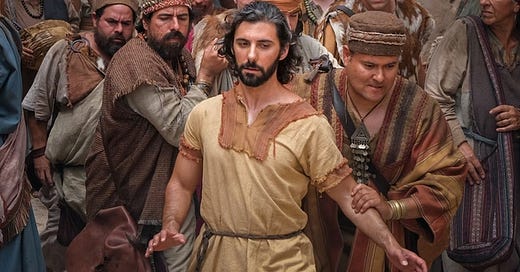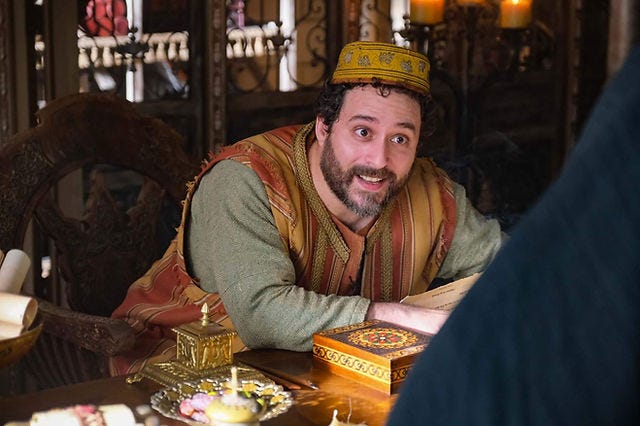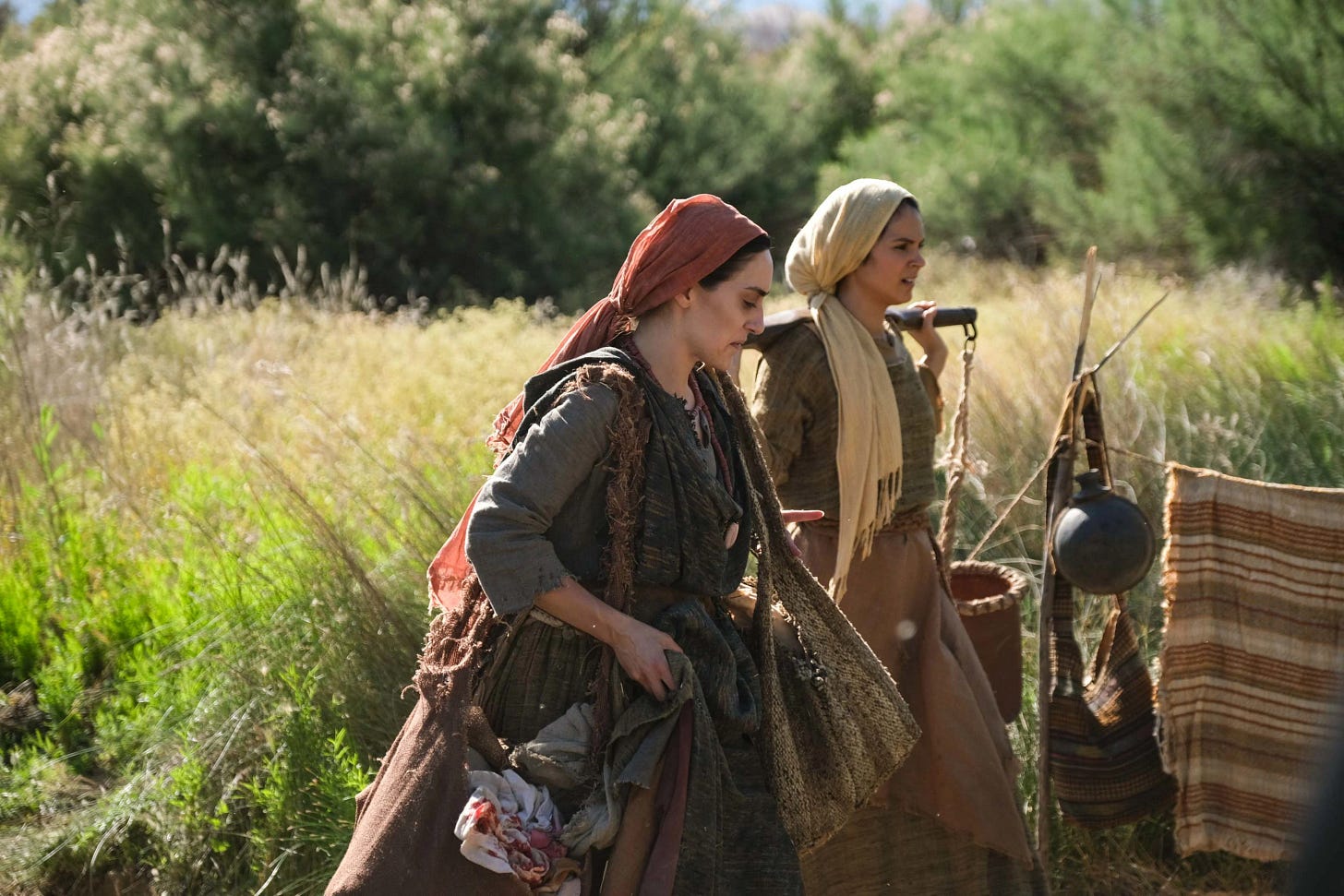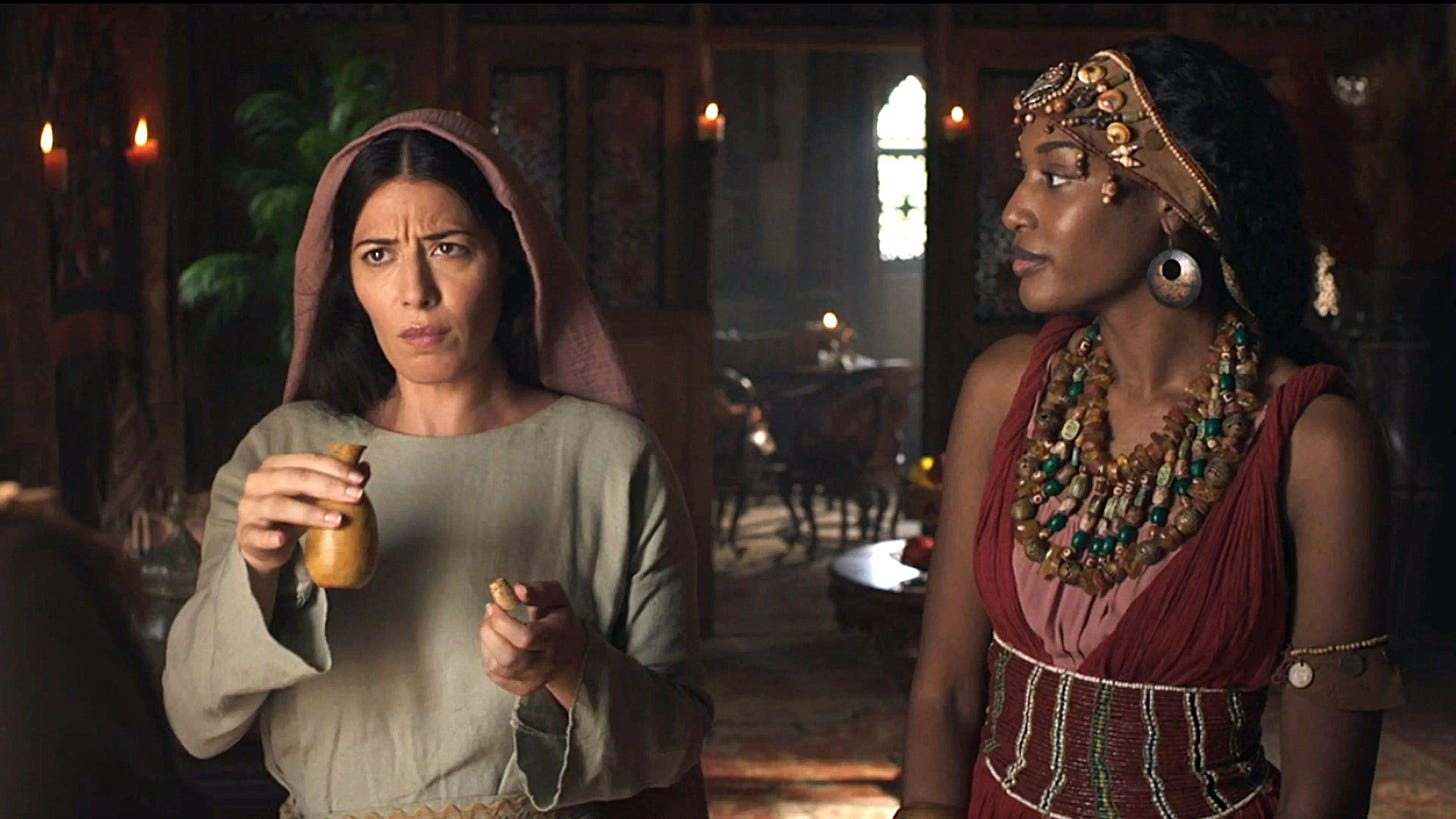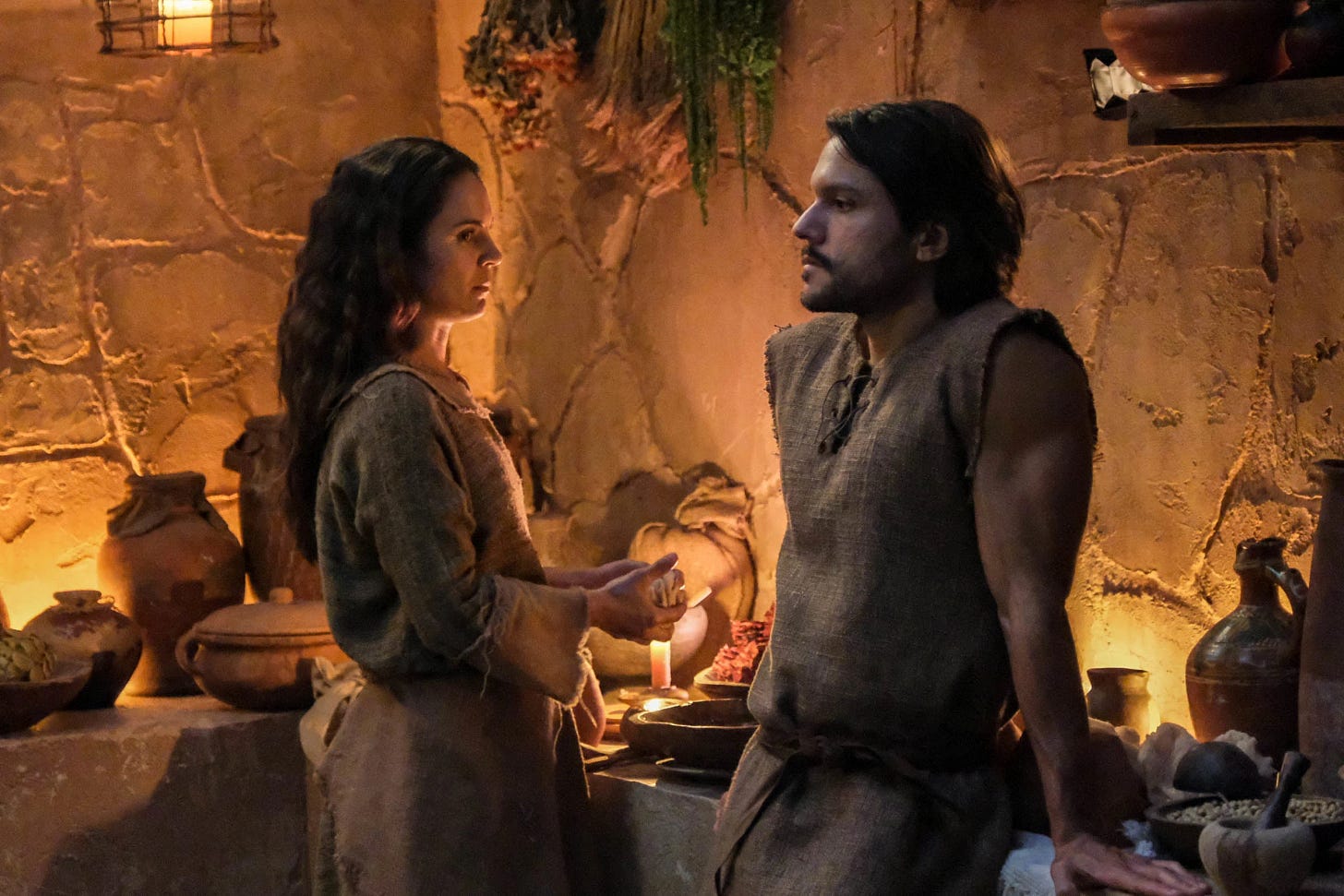Summary
The disciples have been sent out two by two to carry out Jesus’s mission to heal, cast out demons, and preach His words. This episode begins with a beautiful black-and-white, silent montage of these missions set to music and vocalization. The only dialogue included is each of the Apostle groups teaching the Lord’s Prayer. We see mostly successful ministry but there is one tense scene in the second half involving Andrew and Philip being violently escorted out of a town.
The Apostles are back in Capernaum and there is immediate tension between brothers James and John and Zebedee notices. There is also tension between the synagogue officials and the Romans due to the broken cistern. The water issues within the city are causing enormous problems.
Rabbi Yussif visits Jairus, who is furiously studying, to send a message to his family about supplies needed for the cistern. The two have a deeper conversation about Jesus and the dangerous inquiries coming from the Sanhedrin in Jerusalem led by Rabbi Shmuel. Jairus believes Jesus could be the messiah saying, “I would sooner be unborn than return to ignorance of the contents of your letters.” Rabbi Yussif admits that he and Nicodemus agree. They also come to an understanding that they will keep this quiet and report as little back to the Sanhedrin as possible in order to protect Jesus knowing they endanger themselves.
Simon returns home to Eden. His joy in being home seems to Eden to be less about her and the changes she made in their home and more interested in food, sleep, an “early bedtime”, and connecting with “the boys”. She clearly has something that she wants to discuss with her preoccupied husband. He goes to nap, oblivious to the tension. She heads to the well and market irritated. Reintegration is not going well.
On the street, Eden meets Veronica who agrees to take her to a secret spring North of town to avoid the long line in the sun at the well far from town. The conversation between the women on the way to the well reveals that they both have a lot on their mind. Eden finds out that Veronica is not married, despite having traveled to Capernaum all the way from Caesarea Philippi, just before she sees the blooded laundry Veronica brought to the spring. Later in the episode the women meet again at the spring. Eden inquires about Veronica’s ailments and Veronica confesses that she has been bleeding for twelve years. Veronica continues that because of her rare disease she is viewed as unclean. Her parents haven’t allowed her in their home, she is unmarried, and anyone that touches her or her clothing are also unclean. Upon hearing this Eden dismisses her, “Oh, I assure you, I haven’t been touching my husband.” Veronica further explains that she has spent all of her money on doctors that have only made her ailment worse, but she hasn’t lost all hope.
Jairus returns home to get a scroll and the audience is introduced to his pregnant wife and daughter Nili. While helping prepare dinner, Nili collapses while holding her stomach. Her health is rapidly declining. Toward the end of the episode we find out that Nili is sick because of the contaminated water. Jairus tells Rabbi Yussif that the water problem is now an emergency and that everyone must be mobilized to gather clean water. He also confides, “I’m frightened. Rabbi… am I being punished by God for believing in this Nazarene?” Yussif feels guilty but Jairus admits that he cannot change what he now believes and departs back to his family.
The tension continues at Matthew’s old home where Mary Magdalene and Tamar now live. Tamar insults Matthew’s out of style taste while Mary again suggests Tamar sell her jewelry. The two snap at one another just before a knock at the door. Zebedee is there and provides some relief to the tension. He asks the women to taste his olive oil and provide their opinion. Tamar doesn’t hold back and lets Zebedee know that it is rancid. She asks Zebedee some rapid-fire questions about his oil, the grove, and the press demonstrating her knowledge of olive oil production. Tamar believes that they can use the shawl donated by Joanna to invest in Zebedee’s oil business which will multiply the gift and support Jesus’s ministry. They depart to find Judas and discuss the business plans. Zebedee also sells his fishing vessel, telling the buyer that he wants to work for God, not material goods.
Back at Simon’s house the Apostles meet to discuss their missions. Eden works quietly to serve them and Simon is finally catching on that something is wrong. Some of the Apostles seem less enthusiastic about what happened on their missions than others. There is palpable confusion and tension in the room. Big James says, “By using us as vessels, Jesus gave us power but no understanding.” Then the Apostles began comparing the difficulty of their various assigned regions. Big James responds, “I felt like a fraud.” As the Apostles begin to settle down and eat, Andrew also notices that something is wrong with Eden.
Back in Jerusalem, Rabbi Shmuel, Rabbi Yanni, and others gather in front of judges to hear Rabbi Shammai deliver a speech. The audience applaud his rhetoric calling out preachers like Jesus. An edict is passed. Schmuel hopes that they can now arrest Jesus but finds out that the edict is more political than actionable.
Simon and Eden spend a sleepless night with backs to one another not speaking. While Veronica is delivering laundry her customer sees Veronica’s blood and calls out “unclean” shaming her in the street. She hurries away crying. Back at Simon and Eden’s, he tries to break the tension by asking what he should apologize for but his ignorance enrages Eden further. As Eden is about to storm away, Jesus shows up at their door with the disciples and a crowd of pilgrims. Simon loses his cool and raises his voice at Jesus. He storms off into the night while the women console a distraught Eden.
Simon arrives at the broken cistern just before Gaius. The two have an unusual, bonding conversation. The exchange is amusing. Both men are stressed and their worlds are colliding around this symbolic broken cistern. They discover they are both at an impasse. After more bonding over tying knots, the two decide it is within both of their interests to work together to fix the cistern to distract themselves from their other problems. Gaius ends their conversation with the worst advise possible, “If this trouble of yours at home has anything to do with the wife, all I can suggest is you should get used to saying five words: you are right; I’m sorry.”
The episode ends with Jairus’s wife going to check on their daughter. Upon entering her room, she screams and the screen goes dark.
Megan’s Insight
“I’m not inclined to speak with Him at the moment.” How many times have you had that thought? Was it because you were angry about an unanswered prayer? Frustrated with His seeming lack of response? Afraid of the direction in which God was calling you to walk? Or maybe unwilling to face your shame at the moment. Simon is obviously annoyed with Jesus at the end of this episode. He blames Jesus for the intrusion on his home and the troubles between him and Eden.
I think that many of us can relate at times in our journey as Christians. It’s difficult to understand the bigger picture of God’s workings in the world when we can only see through a pinhole in comparison, and we cannot begin to comprehend the magnitude of His love. It’s also easier to run away rather than face a challenge or guilt. But you can only avoid and distract for so long. It’s impossible, not to mention unhealthy, to bury our emotions. When my relationship with our Lord is thriving, I never want to avoid Him, even when circumstances are uncomfortable. Moments when I am “not inclined to speak with Him” are times when I have become self-reliant and I need to remember that He is always waiting with an invitation, and it is up to me to respond.
Mitchell’s Insight
Serving God while living life. In the course of this episode, we see several examples of people struggling with the daily toils of life while still giving God his due worship. John and Phillip are thrown out of town during their preaching. Rabbi Yussif is forced to cease worship to handle a broken cistern. Simon and Eden struggle with balancing their roles in Jesus’s ministry with their obligations to each other. Jairus is attempting to decipher whether Jesus is the Messiah while overseeing the synagogue, assisting in the cistern repair, and worrying about his sick daughter. Veronica’s last twelve years have been plagued by ritual uncleanness in a society that demands cleanness for worship. Even during the writing of this paragraph, I struggled with a 1-year-old girl who was refusing to sleep.
We all know that God is to be served first. Jesus is clear in His teachings that nothing is to hold a higher place than God yet, we have responsibilities entrusted to us by that same God. Rabbi Yussif and Jairus have an obligation to fix the cistern for the good of the people of Capernaum which interferes with their time seeking Truth. I see two helpful considerations in determining whether we maintaining the proper order of things in our life. The first is to consider whether our “distraction” is actually a way in which we love and serve God. Simon and Eden are not supposed to serve Jesus OR love each other. They will be serving Jesus by loving each other. There still may be times where sacrifices are required, but there is not a clear separation of these two obligations. Likewise, I cannot ignore my crying daughter because I’m telling people about God in a Chosen review. Properly comforting this little one entrusted to me is a testament to God’s glory. Speaking of which, I’m getting a lot of random gestures and noises directed my way. Got to go!
Michael’s Insight
The Apostles are clearly feeling many different things upon their return from their mission. They are excited, confused, frustrated, scared, and curious. But one thing becomes very apparent: no one seems to know what they learned from the mission. As Big James states, “By using us as vessels, Jesus gave us power, but no understanding.” Some seemed to just be focused on the healing and preaching and didn’t seem to give much thought to the why of it all like Nathaniel and Andrew. Big James and Philip seem to have really struggled with the mission feeling that channeling that kind of power could be dangerous as it could make them forget who the power really is coming from. And yet others like John had no problem with that level of power and responsibility.
But as Nathaniel and Judas are quick to point out, Jesus said nothing about requiring understanding of what it was they were doing. They didn’t need to know why they were healing ailments, exorcising demons, or preaching the words of Jesus. The purpose of the missions seems to be twofold. The mission sort of serves as a practice run for the Apostles early work in the Church after Jesus is gone. The second purpose is revealed last episode when Jesus says to the Apostles before sending them, “I want you to learn what it means to fully rely on your Father in Heaven.” The purpose of the mission was to give themselves up completely to God the Father, and to rely on Him to provide for their food, shelter, safety, and the words and actions they needed to successfully prepare the way for Jesus.
Take to Prayer
What do you do in tense times? Do you tend to walk toward or away from Jesus when things get tough?
Bible Verses
Jesus sends the apostles
Matthew 9:36-38, 10:1-42
Hemorrhaging woman
Mark 5:25-26; Luke 8:43

